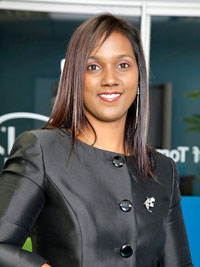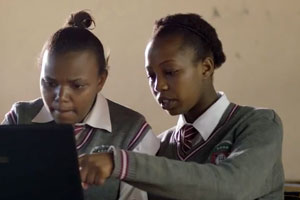Videsha Proothveerajh has been Intel South Africa’s Country Manager since 2009 and more recently the Intel Country Manager for Southern Africa. She is responsible for Intel’s business strategy, operations and development plans in Southern Africa, as well as managing all aspects of the local business. With 18 years’ experience working in high-profile ICT companies such as EDS, Microsoft and Intel, Videsha has specialist knowledge of all levels of the business, including services, software, hardware and computing solutions.

“…we have reported a 100% pay parity for men and women. At Intel we believe that building a brighter future requires bolder steps…”
My career to date: Full circle from the corporate world, to entrepreneur and then back again
I have a total of 18 years’ experience working in high-profile ICT companies. I started at EDS as a graduate and left as a Client Delivery Executive five years later. I was headhunted by Microsoft and held many positions in the course of my five years there. When I left I was the Partner Group Manager.
I took a break to focus on that entrepreneurship bone that needed chewing on and ran my own business for a while focusing on CxO [C-suite level] ICT strategy consulting. This was exhilarating and a hugely successful business, however I longed to return to the corporate world. I started at Intel in 2008 as the Marketing Development Manager and eight years later I still think it is the most exciting company in the world.
I became the General Manager in 2009 and it has been the most fulfilling career move I ever made. I have worked across the continuum from services to software to hardware to computing solutions. I believe the ICT industry is one of the most dynamic and most powerful industries and shapes what happens across all other industries. With regards to tertiary education, I have a B.Com [Bachelor of Commerce] degree, a postgraduate degree in Business Management and an M.B.A specialising in advanced strategic management.
Creating the future

I have been Intel South Africa’s Country Manager since 2009 and more recently the Intel Country Manager for Southern Africa. On a day to day basis, I am responsible for Intel’s business strategy, operations and development plans in Southern Africa, as well as managing all aspects of the local business.
The role is quite different to what people would expect. It involves everything from a strategy, business operations, revenue, legal, brand, stakeholder engagement and management. I am also tasked with ensuring the staff morale is high, especially in times of change, which is daily at Intel as we create the future by understanding where we need to go and introducing challenges that stretch the team.
We are a meritocracy and there is no place for complacency. I love working with people and spend an enormous amount of time coaching, mentoring and focusing on helping others achieve their potential and in doing so helping Intel achieve our joint potential.
Gender balance initiatives at Intel
The empowerment of women in the digital and tech space is core to Intel’s ethos and we are proud of our gender balance across the company. In 2012, Intel sponsored a global research report called Women and the Web, which showed that women make up the minority of Internet users globally – a total of 43% in sub-Saharan Africa.
Determined to change this, Intel runs a programme called Intel She Will Connect, which aims to dramatically reduce the gender and technology gap for young women in emerging markets, beginning in sub-Saharan Africa where the gap is the greatest. The campaign is designed to provide the skills and resources needed to empower women to get and stay online safely, deliver innovative combination of digital literacy training, online peer networks, and gender-relevant content and build partnerships with leading NGOs, governments and other organisations for scale and impact.
In charge of their own destiny: Empowering millions of women

As a leader in the technology arena Intel is committed in setting the industry standards for diversity and inclusion with regards to workplace culture. Internally and externally as a company Intel has been very vocal about our worldwide diversity ambitions and we released our second Diversity and Inclusion Report in 2016.
Goals and progress, including 100% pay parity for men and women
Within the public report are actual goals and progress to date in relation to those goals that our company has made to date in order to diversify our workforce. We aimed to have 40% of our 2015 hires be either women or minorities and we are proud to announce that we surpassed that goal. 43% of our newest hires represent more diverse groups. Underrepresented minorities accounted for 11.8% of those hires.
The hiring of women increased by nearly 43% and we have reported a 100% pay parity for men and women. At Intel we believe that building a brighter future requires bolder steps and we are way ahead in terms of this journey.
More to be done: Enabling a pipeline of young women leaders
20 years after the dawn of democracy in our country, many girls and women still battle to complete an education and gain the skills required to secure work in a very competitive environment. There is still much work to be done to enable a pipeline of young women leaders, in order to ensure that the picture changes dramatically as we move forward.
In South Africa, more than half our population is female and we make up 45% of the workforce. The latest statistics for the ICT sector show that women make up less than 20% of the workforce, and the percentage of women in leadership positions is less than 2%.
Creating a paradigm shift by helping women embrace STEM
Women are not claiming their rightful places in the fields of technology, mathematics, science and engineering. We have to create a huge paradigm shift here if we are to see the myriad of benefits that will come to these disciplines, and the world at large, if women were to embrace them in large numbers.
In South Africa we have an intern and graduate programme that focuses primarily, but not exclusively, on young females from previously disadvantaged backgrounds. The goal of these programmess is two-fold. One is to create a pipeline of amazing talent for Intel and the other is to create a pipeline of amazing talent for the local IT industry.
Representation of women in the local ICT industry is still dismal and I believe it is our duty to show young leaders what technology is able to do and create in order to arm them with the tools they need to change stereotypes and forge a path forward.
When we speak of diversity we look at it in its entirety and not just from a gender perspective as we believe diversity in all its forms, provides us with a competitive advantage and enables us to create a workforce that is optimised for success.
A more balanced perspective by getting more females into IT

By getting more females into IT, we will have a more balanced perspective. We need another point of view of how technology should be designed and used, and how it can be beneficial to society. There are very limited options when it comes to pregnancy and baby-monitoring technology because there aren’t enough females in the medical technology industry. Women have a critical role to play in technology, and their contributions could offer enormous benefits to society.
Define your own idea of success
There are so many lessons I want to share with younger women, so that they have a running start and don’t have to make the mistakes I made. It took me many years to be totally comfortable in my skin. When I was a very young manager I thought it was necessary to take on the persona of others around me who were successful. This was extremely difficult as I forced myself to be someone I was not.
Luckily I had a mentor who schooled me in the art of situational leadership and taught me how to step in and out of character when required. This was immensely valuable and now I can smile when I think about it but at the time it was extremely traumatic. So I tell young women of today, BE YOURSELF, and be changeable at the same time.
Never be defined by a title, whether that’s ‘IT manager’ or ‘woman’, but rather enhance opportunities to learn new skills and be enriched by new experiences so that you can define your own idea of success. Learn from your failures, build networks, claim your seat at the table by executing flawlessly, planning and being prepared and dream big whilst always pulling other women with you as you climb that ladder.
Pay it forward as we don’t have the luxury of thinking that a mass of women in ICT will happen organically. Most importantly find those areas that align to your passions and this becomes soul food – you will never ‘work’ another day in your life.
Next for Intel
Intel is always in a state of change – there are always many opportunities available to people who want to be instrumental in creating the future and building a connected, smart world where we enable everybody not just to dream big but make their those dreams a reality.
I am one of those change agents who requires an environment like this to operate optimally. At Intel the world is literally my oyster – for now I am focused on building out the Southern Africa region and bringing the power of technology to the millions of Africans who have not necessarily had access before.
I look forward to continue being a witness as to how technology empowers and build individuals, communities, countries and regions. I am deeply honoured and humbled to be part of a worldwide and local team that does this. Many people know Intel for our processors, but we do so much more.
Through computing innovation, we push the boundaries of smart and connected technology to make amazing experiences possible for every person on earth. From powering the latest devices and the cloud many depend on, to driving policy, diversity, sustainability and education, we focus on creating value for our shareholders, customers and society at large.
This is what we do every day and the only thing more amazing than our technology is seeing what the world does with it. So for Intel and myself the road ahead is exciting and we get to plan and build that road, not just accept what comes.
http://www.intel.co.za/content/www/za/en/home-users/intel-visibly-smart-technology-for-the-home.html
https://twitter.com/Intel_Africa





